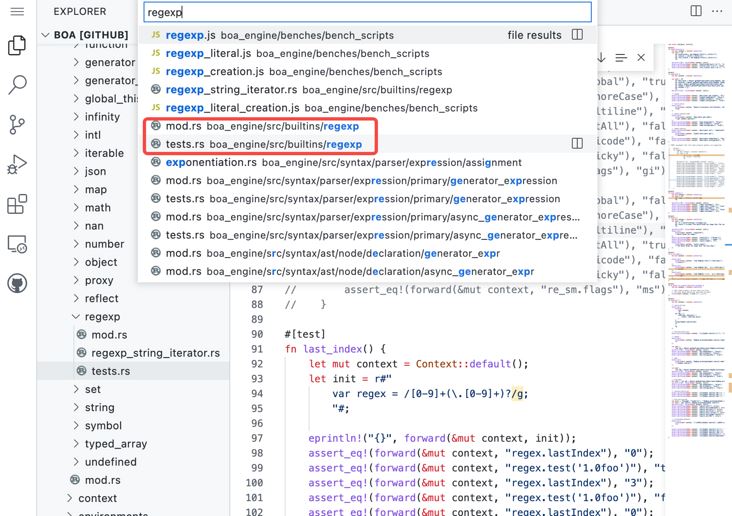js正则中g标志
伍陆柒 人气:0缘起
有一天在思否社区看到有个问题,大致描述如下
const list = ['a', 'b', '-', 'c', 'd']; const reg = /[a-z]/g; const letters = list.filter(i => reg.test(i)); // letters === ['a', 'c']; // 如果正则不使用`g`标志可以得到所有的字母 // 为什么加入`g`之后就不可以了
对问题而言,遍历中的i就是一个字符,不需要用到g。
但是就我对正则的理解(过于浅薄)感觉上有没有g(只是全局搜索,不会匹配到就停下来)应该不影响,激发了我的好奇心。
上面题的建议写法如下
const reg = /[a-z]/g;
reg.test('a'); // => true
reg.test('a'); // => false
reg.test('a'); // => true
reg.test('a'); // => false
reg.test('a'); // => true解密过程
首先可以确定的表现一定是g导致的
搜索引擎
打开 MDN 仔细查看g标志的作用,得到结论和我的理解无二。
我猜想应该就是g可能启用了某种缓存,又因为reg相对过滤器是全局变量,我将代码改为:
const list = ['a', 'b', '-', 'c', 'd']; const letters = list.filter(i => /[a-z]/g.test(i)); // letters === ['a', 'b', 'c', 'd'];
将正则声明到每一次遍历,得到结论就是正确的,验证了我的猜想。也得到了,缓存就是正则中的某个地方
下面我找到对应的源码来查看问题的原因
源码层面
由于最近在看 Rust,所以使用 Rust 编写的源码查看
打开项目后,点击.进入 vscode 模式,command+p 搜索 regexp 关键词

进入test.rs文件,command+f 搜索/g可以找到在 90 行有个last_index()的测试
#[test]
fn last_index() {
let mut context = Context::default();
let init = r#"
var regex = /[0-9]+(\.[0-9]+)?/g;
"#;
// forward 的作用:更改 context,并返回结果的字符串。
eprintln!("{}", forward(&mut context, init));
assert_eq!(forward(&mut context, "regex.lastIndex"), "0");
assert_eq!(forward(&mut context, "regex.test('1.0foo')"), "true");
assert_eq!(forward(&mut context, "regex.lastIndex"), "3");
assert_eq!(forward(&mut context, "regex.test('1.0foo')"), "false");
assert_eq!(forward(&mut context, "regex.lastIndex"), "0");
}看到了有lastIndex关键字,这里再已经大致猜到问题的原因了,g 标志存在匹配后的最后一个下标,导致出现问题。
我们将视线移入到mod.rs文件中,搜索test
在 631 行看到了fn test()方法
pub(crate) fn test(
this: &JsValue,
args: &[JsValue],
context: &mut Context,
) -> JsResult<JsValue> {
// 1. Let R be the this value.
// 2. If Type(R) is not Object, throw a TypeError exception.
let this = this.as_object().ok_or_else(|| {
context
.construct_type_error("RegExp.prototype.test method called on incompatible value")
})?;
// 3. Let string be ? ToString(S).
let arg_str = args
.get(0)
.cloned()
.unwrap_or_default()
.to_string(context)?;
// 4. Let match be ? RegExpExec(R, string).
let m = Self::abstract_exec(this, arg_str, context)?;
// 5. If match is not null, return true; else return false.
if m.is_some() {
Ok(JsValue::new(true))
} else {
Ok(JsValue::new(false))
}
}在test()方法中找到了Self::abstract_exec()方法
pub(crate) fn abstract_exec(
this: &JsObject,
input: JsString,
context: &mut Context,
) -> JsResult<Option<JsObject>> {
// 1. Assert: Type(R) is Object.
// 2. Assert: Type(S) is String.
// 3. Let exec be ? Get(R, "exec").
let exec = this.get("exec", context)?;
// 4. If IsCallable(exec) is true, then
if let Some(exec) = exec.as_callable() {
// a. Let result be ? Call(exec, R, « S »).
let result = exec.call(&this.clone().into(), &[input.into()], context)?;
// b. If Type(result) is neither Object nor Null, throw a TypeError exception.
if !result.is_object() && !result.is_null() {
return context.throw_type_error("regexp exec returned neither object nor null");
}
// c. Return result.
return Ok(result.as_object().cloned());
}
// 5. Perform ? RequireInternalSlot(R, [[RegExpMatcher]]).
if !this.is_regexp() {
return context.throw_type_error("RegExpExec called with invalid value");
}
// 6. Return ? RegExpBuiltinExec(R, S).
Self::abstract_builtin_exec(this, &input, context)
}又在Self::abstract_exec()方法中找到了Self::abstract_builtin_exec()方法
pub(crate) fn abstract_builtin_exec(
this: &JsObject,
input: &JsString,
context: &mut Context,
) -> JsResult<Option<JsObject>> {
// 1. Assert: R is an initialized RegExp instance.
let rx = {
let obj = this.borrow();
if let Some(rx) = obj.as_regexp() {
rx.clone()
} else {
return context.throw_type_error("RegExpBuiltinExec called with invalid value");
}
};
// 2. Assert: Type(S) is String.
// 3. Let length be the number of code units in S.
let length = input.encode_utf16().count();
// 4. Let lastIndex be ℝ(? ToLength(? Get(R, "lastIndex"))).
let mut last_index = this.get("lastIndex", context)?.to_length(context)?;
// 5. Let flags be R.[[OriginalFlags]].
let flags = &rx.original_flags;
// 6. If flags contains "g", let global be true; else let global be false.
let global = flags.contains('g');
// 7. If flags contains "y", let sticky be true; else let sticky be false.
let sticky = flags.contains('y');
// 8. If global is false and sticky is false, set lastIndex to 0.
if !global && !sticky {
last_index = 0;
}
// 9. Let matcher be R.[[RegExpMatcher]].
let matcher = &rx.matcher;
// 10. If flags contains "u", let fullUnicode be true; else let fullUnicode be false.
let unicode = flags.contains('u');
// 11. Let matchSucceeded be false.
// 12. Repeat, while matchSucceeded is false,
let match_value = loop {
// a. If lastIndex > length, then
if last_index > length {
// i. If global is true or sticky is true, then
if global || sticky {
// 1. Perform ? Set(R, "lastIndex", +0加载全部内容
- 猜你喜欢
- 用户评论